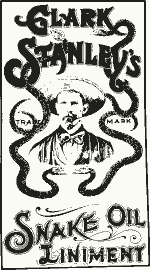How fast do fuel additives work? Depends on what you're using.
How quickly do the best fuel additives work? That’s a very good question, and the answer hinges on the kind of fuel treatment that’s being used.

We've been in the fuel treatment business far longer than most - if you're reading this in 2015, it will have been 106 years this year. So we've seen a lot of stuff come and go in the marketplace. A lot of it has been "products" that make questionable claims and promise the moon but don't deliver. Hence why a lot of people assosicate fuel additives with "snake oil".

What motivates people to buy something like that? People - individuals and companies - are presented with a value proposition in a fuel additive or fuel treatment. Use this treatment, it will do such and such and (hopefully) give you a certain benefit that resonates enough with you that you'll be convinced to try it out. That's usually how those things go.
The question that has to be answered is, how do you know if a fuel additive works? How *can* you know? Do you take the word of someone else, or see for yourself? That's the big question. Taking someone else's word can caused a lot of buyer's remorse. If you can know for sure if something works, you can be a lot more confident in any decision you might make regarding it.
In order to know if something "works", you have to know what constitutes success. You have to know what you're looking for.
You also have to know to know what success does not look like. That's something many people don't know. They expect to see or look for the wrong things, and when they see what they want, they draw the wrong conclusions. Then, when those conclusions don't lead them to what they were really looking for, they blame the additive.
It's essential to know what you can and cannot know here.
If you use ULSD, maybe you add a lubricity additive to try and restore the fuel's lubricity that may have been lost during the sulfur processing. What how would you know if it was working?
What would you NOT look for?
Cetane improver additives are supposed to raise fuel cetane. But how would you know if it was doing that?
You might choose an injector cleaner because you know that clean injectors are the most important step to ensuring best engine performance, and that includes best MPG. Assuming you had dirty injectors to begin with, you would expect improvement in MPG once you cleaned them.
But what would you conclude if your mileage went down upon instead of up? Like most people, you'd be pretty displeased and it would probably sour your view of what you used as worthless.
This is another good case of knowing what to look for. What if you knew that cleaning out carbon deposits would cause your mileage to drop temporarily while the deposits were dissolved in the fuel and burned? They don't burn quite as cleanly as pure fuel, and your mileage would probably drop a certain amount. But you would also expect to see that mileage curve bottom out and then starting rise until it settles on a level of improvement greater than what you started with, because you've now got clean injectors.
If you know that going into it, now when the mileage drops temporarily, you don't think its snake oil. You know that it's working. And when your fuel mileage improves in the end, that knowledge is confirmed to you once more.
Fuel biocides are supposed to kill microbes. If a biocide was really working, you'd look for
What would you not look for? Biocides are a great example of how proper knowledge can keep you from drawing the wrong conclusions. One of the indicators of a microbe problem is increased filter plugging. So you treat the fuel and kill the microbes (supposedly) and......your filter still plug. So you think the biocide didn't do anything.
But you also have to know that once you kill the microbes, they still have to be filtered out of the fuel. So the filters are going to plug up until that happens. Once they're filtered out, you'd see the filter use rate return to normal.
Again, knowing what to look for is essential to reaching the right conclusions and making the right decision.

How quickly do the best fuel additives work? That’s a very good question, and the answer hinges on the kind of fuel treatment that’s being used.
“Are diesel fuel additives worth it?” That’s a difficult question to answer unless we know some things. The answer to the question of Are They Worth...

People get skittish around things they’re not familiar with. And they get especially nervous in situations where they sense there’s a chance they...